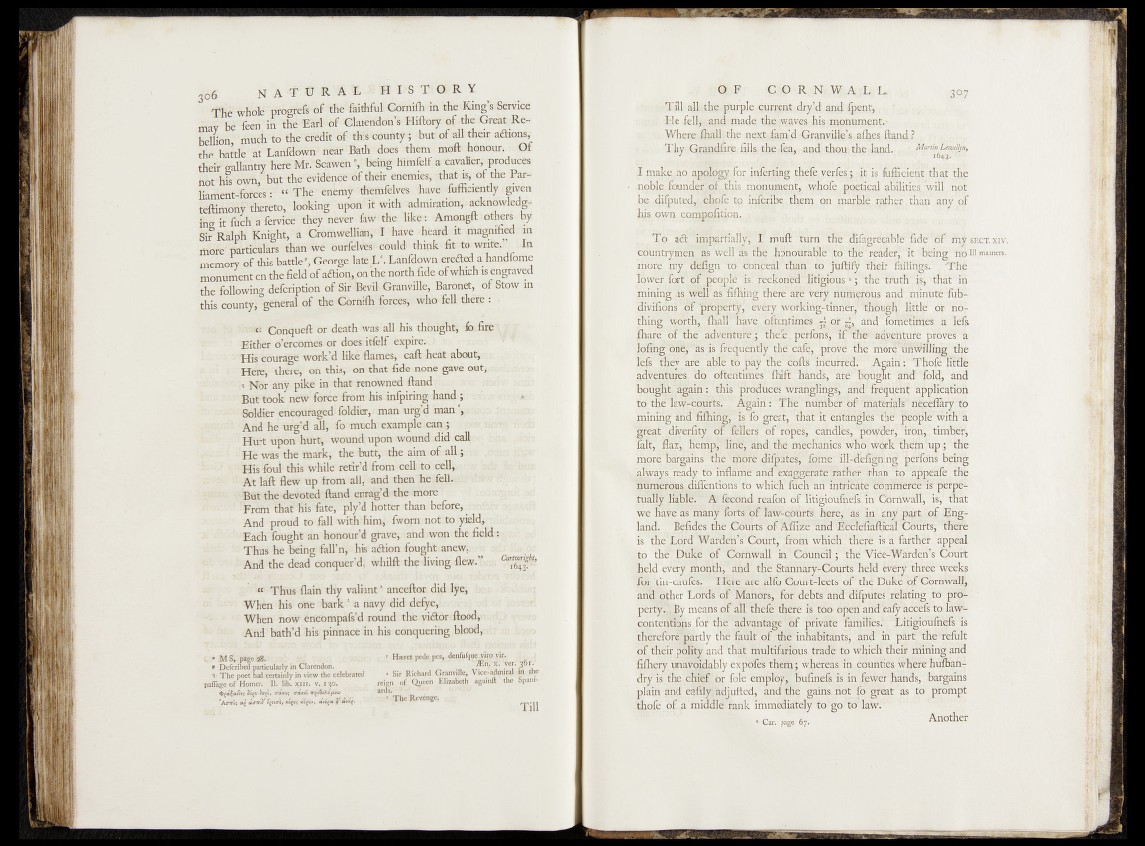
m , 'N A * t p R A L H P S ^ o . R Y
H ie whole' progrefk 6f Cornifli in 'the.Kbg’hiSemcd
jM H M B B ïif to ^ / th cG îf i^ R e -
belHon M l t£e!t¥ëdit ôf' tMéjcéttèty ; but of all their a&ons,
é ë telt^^lÆnâe^fièàÿ-'ÔatÈE does-them moft Mnour. Of
t h e f e M t iV fibre Mr.' Scaweh V fcêMg M P I a cavalier, produces
H | H H E the ëVÎdènéé 'of enemies', that # ot the Par,
Hâirieüt-fôr&s : ^ T h e ërièmÿ tfeïSfëlvèS thave efficiently «given
teffiffionffereto,;; looking tijpdfifit with admii3tiow)> acknowledge
ffid it ffich a fervicë they never fkWAhe like : Among«-'others by
Sir Ralph Knight, a Cromwellian, I have-heard it .magnified in
mote' particulars than we duriêlv^ coukf think fit to write. In
memory of this battlep, George late l/ . Lanfdown ereded a handfome
monument on the field ofaftiomon the north fide ofwhich is engraved
the following defcription o f Sir' feevil Granville, Baronet, o f Stow in
this county) general of the Cornifh forces', ' who fell theft : •
| U Conqueft or death was all his thbiighQ fo.fire\
Either o ercomeB or does ififelf. expired
His courage work’d like flames, caft heat about,
Here, there, on this, on that fide none gave out, ;
, Nor any pike in that renowned hand
But took newfqf<ee; fioffi Ms infpiring haind ; \ f w *
Soldier encouraged* ibldier,; man urg d man
And he urg’t l a|, fo much: examjdeicap; o
Hurt upon hurt, wound upon wound, did call '
He was the mark, the butt, the aka-of a ll;
His-foui this while re&’drifiom ceJi tobcteB));: ;
At laft flew up from all, and thai he fell..
But the devoted ftand enralg’d the «n«e
%rimi that Ms ^ te , ply’d hotter than before, $ lofir
And proud to fall with Mrnj fwom notJto.yd^th'
Each fought an honour’d grave^ HahdfWon the. f i^ .t- ,
Thus he feeing M ’n, his adion -fpughtranew) w arii HaoJ
And the dead conquer’d, whilft the-living flew, ' j ,
“ Thus flain thy valiant ‘ anceftor. did lye,
When his ohe bark1 a navy did defye,;
When now encompafsd round the vidor- flood,
And bath’d his pinnace in his conquering blood,.
C • MSj pageag'.
r Defcribea particularly in Clarendon,
a* T h e poet had certainly in view the celebrated
paflage of Homer. II. lib. xm . y. ;xgb* 1 1
Qgd^urUq Mgv h)^l, ecticof craaii <jr^oui^>Vfiva
*Aaiili a\ icrnftf fyuo-i, Mpt, aii^a g
r Hæret pede pes. denfulipw- vi|ç yir* . . , '
Æri. x. ver. 36 r
• Sir Richard Granville, Vice-admiral in the
reign of Queen Elizabeth againft "the Spanp-
• The Revenge.
Till
Q fM r ..,&?€> R .f% ,% A ^ I^ L. 3;07
Till a&jlpfe p'wph}£ U i r e n t fand fpçnt, | ,
M P e fell,.. and made the waves his monument. •
Where ffiall? t h e :ffand ?
Thy Grandfire fills the fea, and thou the land..
I make, no appjQgyJpç jnforling thefe: verfes ; it is fufficienf that the
noble founder of this monument, w.hqfepoetical abilities. -will not
be difputed, chofe to W P i ^ n i on marble rathec.tîià-n any of
qyn. e p i u p o f i t ip n . f
To ad. impartially, I muft turn the difagreeable fide: of ' öiy séct. xiv.
countrymen as well as'thé honourable to the reader, "it -being no m manners,
more my defign to^mpeaT'* than?“ to juftiry their fàfHqW.*5' .‘The
lower, fort of people is,vyScipriéd litigiousu ; the1 that in
mining well as nffiing tfiere ^ evé fy rihmerfiu^ and^rmnutê 'fub-
divifidns of property, èvéry wórking-timièr, thöugh! ffitlë'.ófe,'?fo^
thing hvorthj | \{bq^nflé^m'iëïÈ
ffiare"" or the' adventbr e n ineg, 'adVefttilté1 ! proces ’x'k
loïmg'o^ f^silnequentlvtro ia re. ^ o v e 'Ihë ’ mor^um^Blfqg the
le|s" they are' able to pay th e 'CQfts^lnchrreQ^'■ J^gaîff^Tho'^e nüiè
advehtüf’es. dq' óftenu^p' 'Shdt :E|bltf, anij
bqugm^again : this product' wrahgfihgs, a’ri'd^ FfëqiieW^ipplicatioil
td tKe iavyfQ^um.' :,Xnà?*number of"matètfafs,in'bjcéflaiy'to
mining'anq fifliîhg',’ |s fo OTeat.'that'lfepianglesJtHe pfe^le wimm
gte^t diveifity" of f i l e r s è^dJ^Bwwqér, lrpm^'timcjb^
fait, flax, hemp^ Tine1,“ *ahd. the n^haqiésïwno|wóïrk '^hepi up ^ "thè
jhorq pàrga^ (jif|)iitó^ ’fdme iïlroefî§pi^f%®l®s bp^g
always readydo inflate ancPëXaggçfâTé ratheh-than to appeafe ^ tKç
nuiitefqus.d^entibnsxo
tuafly liable. A* fécond reafon of ntigioi^^IsVm' CbriiwsCu, is, mat
we have'as màiîy forts o f Ta'vV-cdhrts*, hqre, as' ïn any pa^rt of England.
Bjfides the
is tnëjDqrd' Warden’s Cdurt,'’ tTOm wmtml' mefp® ‘à rarthfef appeal
to the Duke of Cornwall im'Gôtmciî j me^Viée-^ÿrdqn’s Court
held everyk 0onth, and the Stan'nary-Courts held every three* Weeks
for tin-caufek ' Héte ate âlfb Coürt-leets‘o|v thé Dilkç df Cornwall,
ana other Lords 'oj Manors, for debts aria difprilfes ‘rélatipg '.to pro-
perty^By means óf all! ühéfè there is tóo .ópefi’ ariif ^^%cBpiT0*iPvh
cpntèhudris fór the ad vantage''óf pfivàte ftrfjmbsf, Ljtigioufh'qfl 'is
thqrefor^fertly trffi'^mlr.df thé inhabitants, ,à^d:'in pàtt',‘the'refuît
of their polity and' that multiraSous trârl'ë to ^hióh the?P mihlng and
fifhery unavoidably expófes them; whereas. îri.côurifiés whefehuiDari-
dry is the chief or foie employ^ ,'buiinefs is 1h ffiwei'harids, bargains
plairi and eafily|l.djufted,': ârid the gàiris. not ^i gfêat as .to prompt
thofe of ,a middle fank ï&mëaiateiy to goTolaW.
| i ïi.a :,Çar. pàg6 67V Another